Soft skills, or interpersonal abilities, are important in different professional fields and even in day-to-day life. When someone applies for a new job, a spot in a university, or even citizenship, a character reference letter shows who the applicant is and how they get things done, in addition to their resume.
Keep reading this guide to get practical tips and examples to help you highlight these essential qualities effectively in a recommendation letter so that it stands out for all the right reasons.
How soft skills complete the picture in your letter
Hard skills are technical abilities acquired through training or experience, such as proficiency in a specific software or a second language.
These are easy to quantify and verify. Soft skills, on the other hand, are related more to interpersonal skills, such as adaptability, ability to communicate, teamwork, and problem-solving.
These are often learned outside the classroom and are developed more through your professional and life experience and are seen as a reflection of an applicant’s character. This can be shown through volunteer work, leadership roles, and more. They can show that you can be a positive influence in the applicant’s community or workplace.
For example, while a resume can tell an admissions officer that you have a 4.0 GPA, a reference letter can provide a more detailed story on how you overcame a challenging research project.
How to avoid generic compliments
A common trap in reference letters is the use of generic compliments. A sentence like “John is a sympathetic person” or “Jane is a dedicated employee” might be seen as vague and unconvincing.
They say what the recommender thinks, but without any proof it doesn’t mean much. To be effective, your reference letter must provide specific examples that show off a skill in action.
Instead of just stating that someone is a good leader, the letter should describe a situation where their leadership was demonstrated, such as “During a challenging group project, Sarah organized weekly check-ins and delegated tasks fairly, making sure all members felt heard, and our team met every deadline.”
3 Tips to successfully include soft skills in your letter
Here are several tips to help you demonstrate in your letter that someone has the interpersonal skills needed to be successful as a professional, student, or even a new citizen.
Tip 1: Tell a story, don’t just list skills
Paint a picture of the individual and their contributions. Instead of a bullet-point list of skills, a narrative approach allows the recommender to provide context and demonstrate the impact of a specific skill.
For example, in a letter for a scholarship, rather than writing “She has excellent time-management skills,” if you are writing a letter for a student, you could write, “Despite balancing a demanding academic schedule, a part-time job, and volunteer work, Emily consistently submitted her assignments ahead of schedule and excelled in all of her courses. Her ability to manage her time and prioritize her commitments is exceptional.”
Tip 2: Use action verbs to highlight the candidate’s impact
Use action verbs as a tool to write a strong reference letter. By using them, you can transform a passive description into a dynamic one.
Instead of “He is good at problem-solving,” try “He devised a creative solution to a complex logistical problem, improving our process and saving the NGO significant time and resources.”
Take advantage of words like “collaborated,” “initiated,” “mentored,” and “negotiated” to communicate the application of a soft skill and the positive outcome it produced.
Tip 3: Connect skills to specific roles and duties
The most effective reference letters are tailored to the specific role or program the applicant wants to apply to. A letter for a visa application should highlight skills relevant to being a responsible and contributing member of a new community, such as communication and adaptability.
A letter for a college application might focus on critical thinking and resilience. By tying their soft skills to specific roles or situations, you can demonstrate your understanding of the applicant’s goals and support the relevance of the skills being described.
Final thoughts
Qualifications, especially soft skills for candidates are often very similar, and if you need a reference letter or are writing one, you will need to make sure they are noticeable.
They are the qualities that truly define who you are and how you will contribute to any organization or community.
Simply keep in mind that you should:
- Make sure to write detailed descriptions instead of generic phrases
- Tell a story by using specific examples
- Take advantage of action verbs to make your stories more powerful
- Show how these skills were used in roles and duties
By taking advantage of the tips and examples above, you can make sure a recommendation letter is compelling and will strengthen your personal image and help you achieve the applicant’s goals.




